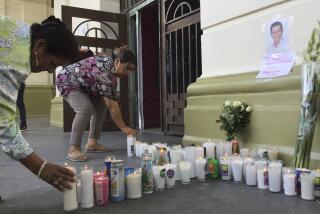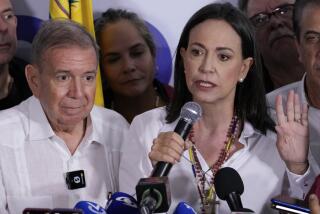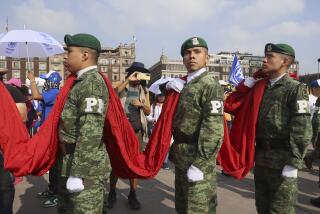At least 24 dead in Philippine election massacre
Reporting from Seoul and Zamboanga City, Philippines -- Twenty-four people were found dead in the southern Philippines after scores of gunmen on Monday kidnapped a caravan of supporters accompanying a woman en route to file her husbandâs nomination papers to run for provincial governor, authorities said.
Officials called the attack a politically motivated massacre. Many of the victims were beheaded and buried in shallow graves.
The victims -- at least 13 of them women -- reportedly included a dozen local journalists covering the filing that marked the start of the Philippine election season.
Twenty-one bodies were recovered late Monday, with three more early today. Police are looking for more than a dozen other victims.
No group has claimed responsibility for the attack in a region known for decades of bloody clashes involving Islamic militants seeking autonomy in this predominantly Roman Catholic nation.
But authorities indicated that Mondayâs violence on the southern island of Mindanao might be the work of political warlords and gangs who wage war against one another with well-equipped private armies.
âThis is a gruesome massacre of civilians unequaled in recent history,â said Jesus Dureza, a provincial official. âThere must be a total stop to this senseless violence and carnage.â
Ismael Mangudadatu, the gubernatorial candidate, was not in the convoy at the time of the attack. He told officials that his wife, Genalyn, called him by cellphone moments before she and her entourage were abducted.
She said 100 men had surrounded the convoy, officials said. Then the line went dead.
Mangudadatu, deputy mayor of the town of Buluan and a fierce political rival of the current governor of Maguindanao province, had received death threats, officials said.
Gen. Leonardo Espina, Philippine national police spokesman, said today that officials believe forces connected to the powerful Ampatuan family, which has held power in the province since 2001, were responsible for the carnage.
Elections are traditionally violent in the Philippines, especially in the south.
On May 14, more than 45 million Filipinos will go to the polls to choose among 87,000 candidates vying for 17,000 national and local positions -- including 268 House seats.
The convoy was reportedly carrying more than 40 political activists and journalists in several vans when it was hijacked near the town of Ampatuan, said army Col. Jonathan Ponce, a spokesman for the 6th Infantry Division. Ampatuan is a city in Maguindanao province on the island of Mindanao.
The bodies were found about three miles away. âMany of them [were] beheaded, including, probably, journalists,â Ponce said.
âTroops are in the area and tracking down those responsible in these killings.â
Philippine President Gloria Macapagal Arroyo declared a state of emergency in two southern provinces.
âCivilized society has no place for this kind of violence,â she said in a statement.
Eid Kabalu, a leader of the countryâs largest Muslim rebel group, the Moro Islamic Liberation Front, called the attacks âgruesome.â
Late Monday, the Philippine National Press Club criticized what officials called the withholding of information by authorities on the fate of the journalists.
âWe were shocked and grieved to hear what happened to our colleagues,â said the groupâs president, Benny Antiporda.
Human rights activists said more than half a dozen journalists are killed each year in political and religious violence in the Philippines.
âThe Philippines is a very dangerous place for reporters, especially in the south,â said Vincent Brossel, head of the Asia desk for the Paris-based Reporters Without Borders.
âThere is a large culture of violence, nepotism and impunity to law and order,â Brossel said. âThere are influential, rich and powerful people who do whatever they want. But if this number is confirmed, it will be the biggest slaughter in this country in many years.â
Jacinto is a special correspondent based in Mindanao. Special correspondent Sol Vanzi in Manila contributed to this report.
More to Read
Sign up for Essential California
The most important California stories and recommendations in your inbox every morning.
You may occasionally receive promotional content from the Los Angeles Times.











